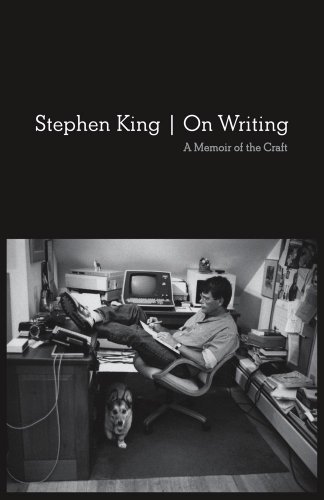All Nonfiction
- Bullying
- Books
- Academic
- Author Interviews
- Celebrity interviews
- College Articles
- College Essays
- Educator of the Year
- Heroes
- Interviews
- Memoir
- Personal Experience
- Sports
- Travel & Culture
All Opinions
- Bullying
- Current Events / Politics
- Discrimination
- Drugs / Alcohol / Smoking
- Entertainment / Celebrities
- Environment
- Love / Relationships
- Movies / Music / TV
- Pop Culture / Trends
- School / College
- Social Issues / Civics
- Spirituality / Religion
- Sports / Hobbies
All Hot Topics
- Bullying
- Community Service
- Environment
- Health
- Letters to the Editor
- Pride & Prejudice
- What Matters
- Back
Summer Guide
- Program Links
- Program Reviews
- Back
College Guide
- College Links
- College Reviews
- College Essays
- College Articles
- Back
On Writing by Stephen King
Writing fiction books has always been an interest of mine. I have looked for ideas that could help me become a better writer, but I have not found exactly what I need. It wasn’t until I read, “On Writing,” by Stephen King that I discovered something to help me improve my writing skills. Since King is a famous fiction author, I figured his ideas on writing a good fiction novel would be very helpful.
Stephen King’s purpose for writing this book is to teach the readers how to properly write a fiction novel, or at least give them certain ideas to build from. He achieves this by keeping the reader’s attention and giving them examples to succeed with their own writing. As someone who has a love for writing, I will use what I learned from King when I’m putting my own thoughts down on paper. Although I didn’t necessarily agree with all of his suggestions, the majority of what he shared was valuable to me.
Stephen King, an accomplished writer, mostly achieves his purpose for writing this book; however, I have a couple of criticisms. The first is regarding his explanation on grammar. He wanted to be brief in order to keep our attention. Instead, he went more in depth than he needed to with grammar. In actuality, he did not keep my attention. Even though he had good examples of what to do and what not to do with grammar, I didn’t learn as much as I would have hoped. Therefore, he didn’t help me in this area of writing.
Another criticism is when he tells the reader to write the way people talk nowadays. He suggests using profanity would make the dialogue more interesting because it is how some people express certain feelings. “If you substitute ‘Oh sugar!’ for ‘Oh ----!’ because you’re thinking about the Legion of Decency, you are breaking the unspoken contract that exists between writer and reader...” (pg. 186) This advice might be helpful to some potential writers, but profanity can be offensive to many people, so I wouldn’t include it in my writing. I know others feel the same way, so for me this wasn’t a helpful suggestion.
Despite the few criticisms, Stephen King was successful in giving me ideas on how to write. Throughout the book, he tells the reader to “...take your story through at least two drafts; the one you do with the study door closed and the one you do with it open.” (pg. 209) This means when writing your first draft, keep all of your ideas to yourself so that nobody puts other thoughts into your mind. Begin your second draft with the door open, allowing your Ideal Reader – the person you write for and ask criticism from – to read your first draft. This will help me become a better writer because it will allow me to get all of my ideas down instead of getting feedback on parts of my writing.
King makes this book enjoyable to read not only because he gives interesting ideas, but because he connects with the reader. While talking about his life and how he began to write, he tells us he understands how difficult writing can be since he was once a beginning writer, receiving several rejection slips from publishers. No matter what, he kept working hard. This should help any writer, including myself, stay motivated.
I thoroughly recommend this book to other readers who might pursue a career in writing or just want to become better writers. This book is going to help me because it taught me to not give up on an idea, stay focused, and write as often as I can so my ideas don’t slip away. Stephen King without a doubt, accomplished what he set out to do when he wrote this book, which was teaching the reader how to write a successful novel.
Similar Articles
JOIN THE DISCUSSION
This article has 0 comments.

